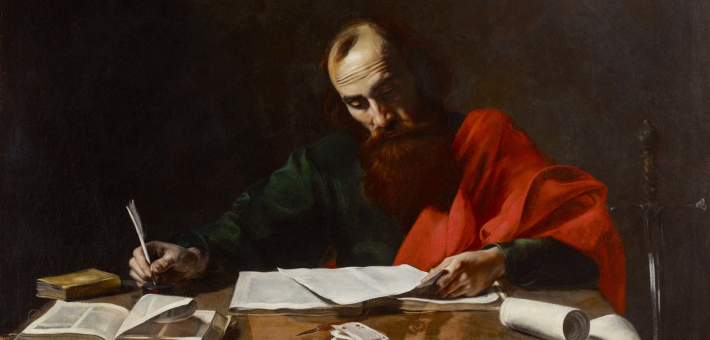Commentary on Genesis 25:19-34
Genesis 25:19-34 continues the Abraham story through his progeny, now his grandson Jacob and all his relationships, which begins the “generations” of Isaac (25:19). Though historically referred to as “the Jacob cycle,” Genesis 25-36 provides readers with the complicated story of a number of family members—ambition, deceit, sorrow, death, birth, encounters with the divine, love, and enmity. The ancestral tales are important for those who follow them to know, in the colloquialism of the U.S. Deep South, “who their people are.” Family matters now and in the ancient Israelite world. And in this case, family continues the promise God made to Abraham.
Before this portion of the text, we learn in verse 5 that Keturah, Abraham’s wife after Sarah, has six sons, who have become prolific in their progeny and, in verses 13-16 we learn that Ishmael has 12 sons already, who themselves are having children. In other words, Abraham has many sons, and his seed is spreading in the world. But the promise in Genesis 17 was to continue through the loins of a child yet unborn to Sarah. When Isaac is born, both parents are old, so it seemed unlikely. It is the continual tension of promise made and promise yet to be fulfilled that is the formulaic tension of the biblical texts. And, if the preacher wants to make the case, this is the continued tension in our lives. Infertility threatens family continuation, in the ancient text and now.
If the question of how the family will continue is paramount, so is the question of how the family will function. We enter this story after Isaac and Rebekah have been married 20 years. With no children, Isaac prays to God who closes and opens wombs (Genesis 20:18; 1 Samuel 1:5). Family is foundational, so a barren Rebekah is a problem. Rebekah apparently did not have an easy pregnancy, which led her to pray about the jostling within her womb. She learned she carried two nations, and that “the older will serve the younger” (25:23). This trope of the ascendent younger child shows up in the biblical texts several times, including with Isaac over Ishmael Genesis 17:18-19); Joseph over his elder brothers; and David over his elder brothers (1 Samuel 16), for example. Here the story also provides etymology for names and activities, explaining the strife between warring nation states, as in, “those boys have been fighting since before they were born.” The birth also provides us with etymology for the boys’ names. Jacob, who name means “heel” and “deceiver” or “supplanter,” depending on vowel pointing, and Esau the “hairy one,” are so named, we are told, because Jacob grabs his brother’s heel to make it from the womb and Esau is hairy. Esau will later be referred to as “Edom” because of the red stew (and because he was red when he was born).
The boys have very different personalities, and the preacher might find a way to speak of these differences positively—as in: masculinity takes on different expressions. Jacob prefers the tents and cooking (he made a mean stew!) and Esau prefers being an outdoorsman. It is not these preferences that distinguish them, but their character or the way they take advantage of one another (or the way Jacob takes advantage of Esau’s hunger and impatience). The conflict and/or lack of closeness between the twins become apparent as time passes. The challenge here is how the parents treated them. Jacob “loved” Esau because he loved meat (25:28) and Rebekah “loved” Jacob, no doubt because he stayed among the tents and around her. What happens when parents have a favorite child, and it shows? What happens between the children and between the parents? This approach might yield some reflection for the preacher.
It is easy to go after Jacob for getting his brother’s birthright from Esau by using his skill as a cook to taunt Esau while he was hungry, with the words “sell me your birthright” (25:31). Esau couldn’t see/think/feel beyond his hunger. I am reminded of my mother saying to me, whenever I said I was “starving,” that it takes 40 days to die of starvation. It is likely after a day of hunting that Esau was hungry or “famished” as he claimed, but it wasn’t likely that it was worth giving up his future. He was shortsighted in the moment and his younger brother took advantage of his impetuousness. Esau could not see any value in an intangible birthright, in a covenant with God when the tangible and tasty stew was right before him. Here is a point to consider about human behavior and what we do when we don’t think beyond our desires in the moment. We have often heard of “delayed gratification,” but sometimes are just as quick to give up a better future for instant gratification. What he gave up was the role of patriarch for the family, the double portion of an inheritance, and the social security and status that comes with all of the above. He gave up an inheritance for which he would not have to work, but which was his by beating his twin brother out of the womb (see Deuteronomy 21:15-17). Jacob takes advantage of his brother’s weaknesses. It seems he knew them well.
It will be years before the implications of Jacob’s actions bear fruit, but he knew the value of the birthright. Did he learn that while listening to his father regale him with stories while he was in the tents? Did he learn it in the cooking tents, listening to her mother and servants as they prepared to feed the family and servants? Had Rebekah told him about the word she had received about his ruling over his brother, before he was born? Did he hear the stories of God’s mercy toward the Abrahamic line and envision himself as the one to carry it forward? Did he know God had chosen him from the beginning and decided he needed to “help God out”?
It would be easy to demonize either of the men, but what they are is complicated men in a lineage God has decided for God’s own reasons to bless. Jacob is neither evil nor perfectly virtuous. He is human. So is Esau. This observation does not excuse them; but it does help us reflect on the ways God’s work gets done through ordinary people. Esau, like Ishmael before him, would also amass great wealth and become a leader of nations. A preacher might want to widen the scope to “the rest of the story,” but it’s not necessary. There is plenty in this pericope on which to ponder about the ways God leads, provides, and grants blessings in our lives.


July 16, 2023